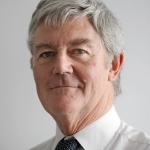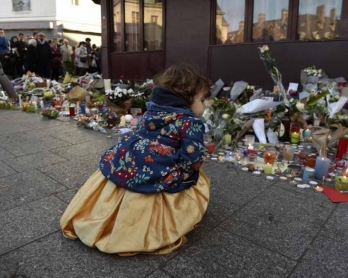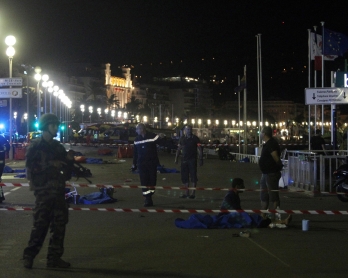When death comes for you
Nice, France -- Two images will not go away. One of a huge white truck, scattering the crowd and hurtling towards us in a clatter of metal shards.
The other of a family, three or four adults, a small child in a stroller and another, about five years old, getting in the way to his mother’s irritation. They were at the top of the steps as my wife Sylvie and I climbed up from the beach after watching the Bastille Day fireworks display in Nice.
I reported from Beirut in 1982 as Israel bombed the city. I was only eight blocks from the Twin Towers in New York City when they collapsed in September 2001. But never in all my decades of reporting had I been in a situation like the one in Nice.
The day had been hot and sunny but in early evening banks of black clouds rolled down from the Alps towards the city and gradually covered the sky out to sea. I commented to Sylvie that they would add a dramatic touch to the fireworks which would be set off on half a dozen boats anchored about 300 metres offshore.
At 22:00 promptly, the lights were extinguished along the central section of the Promenade des Anglais, the magnificent avenue that runs for some eight kilometres from the historic old city of Nice westwards in a great arc round the Bay of Angels.
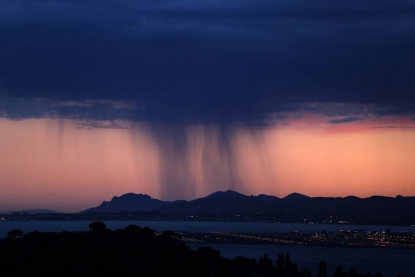 A storm approaches Nice hours before the attack. (AFP / Valery Hache)
A storm approaches Nice hours before the attack. (AFP / Valery Hache)A collective sigh of anticipation went up from the thousands of people sitting or standing on the pebbled beach or on the benches of the iron railings of the walkway above and behind us.
Further back, beyond the double roadway, divided by a long corridor of palm trees, tourists filled the windows of the grand hotels : the Palais de la Mediterranée, the Westminster, and the legendary Negresco.
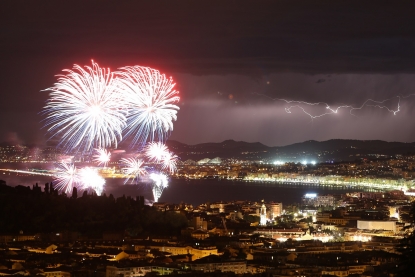 (AFP / Valery Hache)
(AFP / Valery Hache)Nice draws more tourists than any city in France outside Paris, and all around us people were chatting in various languages as the firework display began. For 25 minutes it continued in a gradual crescendo of whooshes, sparks and colour until what the French call the "final bouquet," a curtain of golden fire descending on the dark waters of the Mediterranean.
The crowd applauded and began to slowly move away along the Promenade.
Some two kilometres to the west, the final bouquet would have told the truck driver that it was time to start his engine, mount the kerb onto the promenade and start rolling towards the unsuspecting holidaymakers.
As we got to the top of the steps, we felt a drop of rain and agreed to try to get ahead of the crowd so as to walk swiftly back to our daughter’s apartment.
A family, probably French Caribbean, were in front of us and the mother was telling her little son "don’t get in the way of the stroller, you keep doing that."
We manoeuvered around them, then weaved our way through the crowd. Some people were still sitting on the beach, others on benches. A man was selling roasted nuts from a stall; a woman touting fluorescent head bands and wavy plastic light sticks from a bucket.
Sylvie and I moved briskly. Ahead of us the crowd was thinning out, but there were hundreds of people in front of us. By now we were only fives minutes’ walk from the apartment, one street back from the promenade.
Suddenly, about 50 metres away, the truck seemed to explode out of nowhere, rearing over the heads of the people. Headlights blazing, it was swaying and it weaved from side to side of the promenade. There was a racket of screeching metal as it smashed into seats, a bicycle stand and the guard rail above the beach.
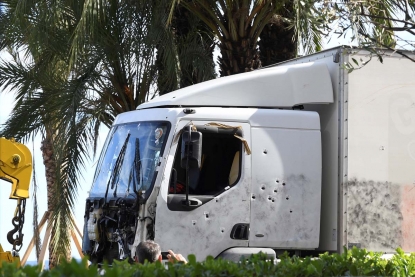 The truck the morning after the attack. (AFP / Boris Horvat)
The truck the morning after the attack. (AFP / Boris Horvat)We had literally three seconds to shout "Sylvie!", "Robert!" and throw ourselves to the right into the roadway. The truck thundered past. I put up my left hand to protect my face from a shower of broken glass and plastic.
Shaking with fear we helped each other across the avenue ; there was some traffic and we had to be careful not to get run over; through the palm trees, across the second roadway and onto the sidewalk.
Our first reaction was to call our daughter, who was at a party in another part of town and tell her to stay put.
All around us people were screaming, running; police sirens began to wail. We moved, not running but walking as fast as we could, to the safety of the apartment.
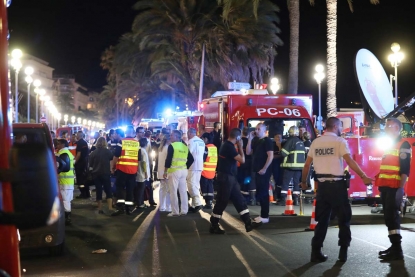 Rescue and workers on the scene on the attack.
(AFP / Valery Hache)
Rescue and workers on the scene on the attack.
(AFP / Valery Hache)I called AFP. The desk editor asked sensible, professional questions.
Could I be sure that the truck driver had not lost control of his vehicle, had a heart attack for example? No, I could not be 100 percent certain, but the truck was so large it could only have been driven deliberately onto the promenade, and it was going so fast I was sure he was determined to kill people.
How fast? I guessed about 80 kilometers an hour.
Had I seen people hit? In the split second after the truck roared out of the night, I had certainly seen people thrown left and right. It was possible that some had the time to jump, like us, but surely some must have been hit. After the truck had passed, Sylvie looked back and saw a body, motionless in a pool of blood.
Yes, I told the desk editor, we had seen people hit.
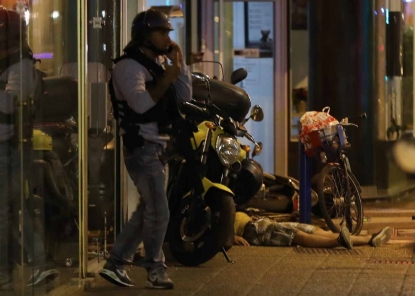 The body of one of the victims lies on the ground. (AFP / Valery Hache)
The body of one of the victims lies on the ground. (AFP / Valery Hache)Reporters are supposed to have a sense of detachment, to be able to take in facts, details dispassionately and clearly. But I had never been in a situation like this.
I lived for three years in Lebanon during the civil war and sometimes had to shelter from gunfire. But even when the Israeli army besieged and bombed Beirut in June 1982, I never felt that I was a target.
On September 11, 2001, I was only eight blocks from the Twin Towers of the World Trade Center when they collapsed. I spent two hours interviewing survivors, rescue workers and policemen near Ground Zero, taking notes and phoning AFP Washington whenever possible to dictate copy.
But in Nice, for the first time, I knew that someone wanted to kill me. Not just me of course, but also my wife and the thousands of people with whom we had been happily cheering a display of fireworks on a beach front. Young people like my daughter; older people; and families with little kids in strollers.
I described what I had seen and answered the editor’s questions as honestly as I could. But I was so shaken that late the following day, when we returned to the promenade, I could not be sure at which point we had had to dive for safety the previous night.
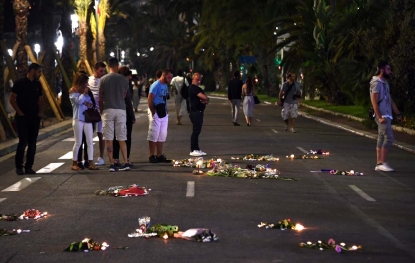 People at makeshift memorials for victims of the attack.
(AFP / Anne-christine Poujoulat)
People at makeshift memorials for victims of the attack.
(AFP / Anne-christine Poujoulat)A couple of hours after I alerted AFP, the editor called to ask if they could use my byline (I retired from AFP over three months ago). I said the information I had given was so scant it hardly merited that, but if they wanted to, it was fine by me.
AFP likes bylines for its clients. Next day, I gave interviews over the phone to two BBC channels, to the New York Times and to, Monocle online ; and I spoke to reporters from the Wall Street Journal and the Daily Telegraph.
Recounting the story over and again helped me come to terms with what had happened (some PTSD [post-traumatic stress disorder] experts say it is what enables reporters to go on doing their job). My delivery became more assured ; the BBC interviewer complimented me on my "journalist’s eye", another said I was "incredibly articulate". Friends texted me saying I had been quoted in Le Monde and La Voix du Nord.
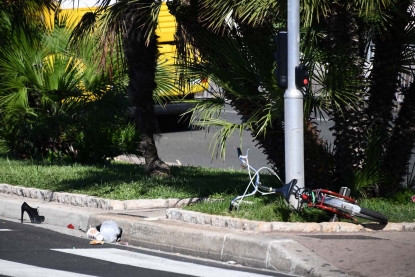 Personal belongings left behind on the scene of the attack.
(AFP / Anne-christine Poujoulat)
Personal belongings left behind on the scene of the attack.
(AFP / Anne-christine Poujoulat)I felt a certain professional satisfaction in having reacted quickly and as honestly as I could.
But the byline worries me. It seems to make me the focus of the story.
I am extraordinarily lucky to be alive, but this was not about me. It is about the 84 people who died in and shortly after the attack, three dozen of whom were still unidentified four days later. It is about that family with the stroller and the toddler who kept getting in the way. I keep wondering if any of them were killed or hurt. They have no byline.
 (AFP / Frederick Florin)
(AFP / Frederick Florin)


